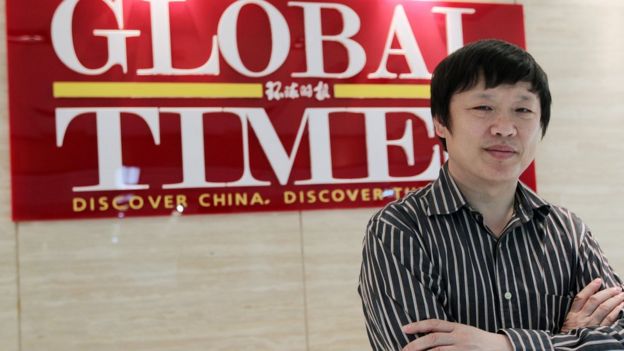Ai Weiwei: ‘Too Late’ to Curb China’s Global Influence
The leading Chinese dissident, the artist and filmmaker Ai Weiwei, says China’s influence has become so great that it can’t now be effectively stopped.
“The West should really have worried about China decades ago. Now it’s already a bit too late, because the West has built its strong system in China and to simply cut it off, it will hurt deeply. That’s why China is very arrogant.”

Ai Weiwei has never minced his words about China. “It is a police state,” he says.
The artist famously designed the Bird’s Nest stadium for the 2008 Beijing Olympics, but ran into serious problems after he spoke out against the Chinese government.
Eventually, in 2015, he left China to come to the West. He lived first in Berlin, and last year settled in Cambridge.
Mr Ai believes that China today uses its immense economic power to impose its political influence.
It’s certainly true that China has become much more assertive in recent years.
Growing Influence
Until around a decade ago, China presented a modest face to the world. The official government slogan was: “Hide your light and bide your time”. Ministers insisted that China was still a developing country with a lot to learn from the West.
Then Xi Jinping came to power. He became secretary-general of the Chinese Communist Party in 2012, and President the following year. He introduced a new tone.
The old modesty faded, and there was a different slogan: “Strive for achievement”.In some ways China is still a developing country, with 250 million people below the poverty line.
Yet it is already the world’s second-biggest economy, and is on course to overtake
the US over the next decade or so. China’s influence in the world is becoming more and more obvious, at a time when America’s authority has visibly declined.
I’ve seen for myself the clear signs of China’s growing political strength and involvement right across the world, from Greenland and the Caribbean to Peru and Argentina, and from South Africa and Zimbabwe to Pakistan and Mongolia.
The chair of the British Parliament’s foreign affairs committee, Tom Tugendhat, has recently accused China of pressurizing Barbados to dump the Queen as its head of state.
Today, China has a significant presence virtually everywhere on the globe. Any country which challenges its basic interests suffers for it.
When the Dalai Lama visited Downing Street, Anglo-Chinese relations were put into deep-freeze.
And recently, when the speaker of the Czech Republic’s parliament visited Taiwan, a top diplomat warned that “the Chinese government and people will not sit idle when facing the open provocation from Czech Senate Speaker and the anti-China forces behind him and must let them pay a heavy price”.
Multiple Stand-Offs
Yet the outspoken and highly influential editor-in-chief of China’s Global Times newspaper, Hu Xijin, rejects any suggestion that China is an international bully.
“I want to ask you, when did China ever pressure any country to do anything against their will? It is the US that continues to carry out sanctions in the world, especially economic sanctions on so many countries. Which country do you know China has sanctioned?
“Did we ever sanction an entire country? Only on specific issues did we express our dis-satisfactions, and only as a reaction when our country has been openly offended.”
Yet China is currently involved in angry stand-offs with a whole range of countries: Taiwan, Australia, Japan, Canada, India (with whom China recently fought a violent border skirmish), Britain and of course the US.
The language the Global Times sometimes uses can sound like the worst rhetoric from the old Mao Zedong days.
Mr Hu himself recently wrote an editorial describing Australia as “the chewing-gum under China’s boot”. When I asked him about this, he said that the current Australian government had repeatedly attacked and annoyed China.
“I do feel they are like a piece of gum stuck to bottom of my shoe. I can’t shake it off. It’s not a nice feeling. I said it as an expression and it is my right to an opinion.”
On Hong Kong
Mr Hu is close to President Xi, and we can assume he wouldn’t say these things unless he knew he had the backing of China’s top leadership. When I asked him for his views on Hong Kong, he didn’t hold back.
“The Chinese government does not object to Hong Kong’s democracy and liberties, including Hong Kong people’s right to demonstrate peacefully in the streets.
Read Also: Trump Major Carmakers Sue US Government Over China Tax
“But the key is, they have to be peaceful… We support the even more resolute use of force by the Hong Kong police against violent protests.
“If the violent protesters threaten police life, when they launch very sharp projectiles, and throw petrol-bombs or Molotov cocktails at police, I believe police should be allowed to use their guns, and they should open fire.”
Strong stuff, and if the police in Hong Kong really did start shooting down demonstrators it would result in a huge international reaction.
Most foreign observers think that China’s aggressive behaviour in fact hides an underlying nervousness.
The Communist Party isn’t elected, so it has no way of knowing how much genuine support it has in China. It can’t be certain of surviving a serious crisis – a major economic collapse, for instance.
President Xi and his colleagues are haunted by the memory of how the old Soviet empire simply vanished between 1989 and 1991, because it lacked any support from ordinary citizens.
Mr Hu doesn’t accept that a new Cold War has started. China’s dispute, he says, is basically with the US.
He makes the point that President Donald Trump’s attacks on China are very much linked to the presidential election on 3 November, and his efforts to win it.
Indeed after the election, the atmosphere is likely to improve – whoever wins.
China is too big, too involved in everyone’s lives, for the US and its allies to remain in a permanent state of outright hostility towards it.
But that simply reinforces Mr Ai’s warning: that it’s now too late for the West to protect itself against China’s influence.




